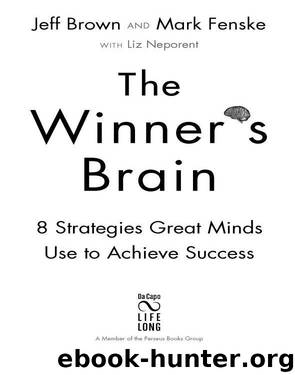The Winner's Brain by Jeff Brown; Mark Fenske

Author:Jeff Brown; Mark Fenske
Language: eng
Format: epub
Publisher: Perseus
Published: 2010-03-22T16:00:00+00:00
What Are Emotions, Anyway?
We think Emotional Balance is one of the most misunderstood Winner’s Brain traits, perhaps because scientists and philosophers have debated for centuries, and are still debating, exactly what emotions are. We’re with the growing number of experts who view emotions as a sliding scale of psychological responses ranging from pleasure at one end to displeasure at the other; these reactions allow us to assess the significance of everything we encounter—from events, to people, to even our own thoughts—with respect to our own needs and goals. This may sound like a somewhat detached and clinical explanation for something that rarely feels detached and clinical, but it actually does a pretty good job quantifying the subjective nature of feelings.
Not surprisingly, there is a direct link between the psychological aspects of emotions and the body’s physiological response. This applies not only to voluntary responses but also to involuntary physical responses, a phenomenon frequently expressed in speech. Nervousness is described as butterflies in the stomach, excitement as a racing heart, fear as a knot in the gut. It is this primal connection between the physiological and physical that drives many of our actions and subsequent thoughts: How you feel dictates how you react.
All aspects of emotion are a result of specific brain activity, but until recently it was difficult to pinpoint exactly from which part of our neurocircuitry feelings originate. Now, thanks to modern technology, neuroscientists can show that emotions are generated in a network of brain structures, including regions of the anterior cingulate cortex, the orbital-frontal region of prefrontal cortex directly above the eyes, and the insula, along with heavy involvement of the amygdala. A relatively common oversimplification equates the amygdala with emotion, but we now know that the processing of emotions is immensely complex. Nevertheless these compact clusters of cells in one of the most primitive parts of the brain do indeed contribute significantly to the elation you experience when you score tickets to a sold-out concert, and the disappointment you feel when you realize your seats are located directly behind a column. As you’ve read in other chapters, getting a handle on this small but mighty brain structure is the key to developing many Winner’s Brain traits.
Download
This site does not store any files on its server. We only index and link to content provided by other sites. Please contact the content providers to delete copyright contents if any and email us, we'll remove relevant links or contents immediately.
The Art of Thinking Clearly by Rolf Dobelli(8843)
Mindhunter: Inside the FBI's Elite Serial Crime Unit by John E. Douglas & Mark Olshaker(7835)
Change Your Questions, Change Your Life by Marilee Adams(6641)
Nudge - Improving Decisions about Health, Wealth, and Happiness by Thaler Sunstein(6634)
Mastermind: How to Think Like Sherlock Holmes by Maria Konnikova(6236)
The Power of Now: A Guide to Spiritual Enlightenment by Eckhart Tolle(4756)
Men In Love by Nancy Friday(4327)
Factfulness: Ten Reasons We're Wrong About the World – and Why Things Are Better Than You Think by Hans Rosling(4022)
The Confidence Code by Katty Kay(3566)
Thinking in Bets by Annie Duke(3533)
Man and His Symbols by Carl Gustav Jung(3315)
Three Women by Lisa Taddeo(2920)
The Worm at the Core by Sheldon Solomon(2918)
Why Buddhism is True by Robert Wright(2827)
Liar's Poker by Michael Lewis(2812)
The Inner Life of Animals by Peter Wohlleben(2767)
Descartes' Error by Antonio Damasio(2732)
The Power of Mindful Learning by Ellen J. Langer(2710)
The Slow Fix: Solve Problems, Work Smarter, and Live Better In a World Addicted to Speed by Carl Honore(2574)
